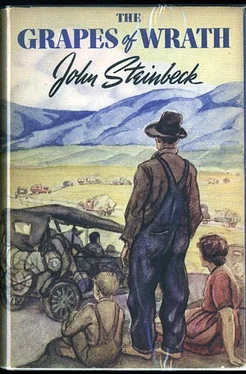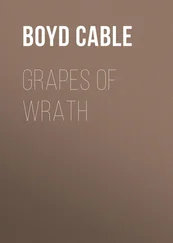John Steinbeck - The Grapes of Wrath
Здесь есть возможность читать онлайн «John Steinbeck - The Grapes of Wrath» весь текст электронной книги совершенно бесплатно (целиком полную версию без сокращений). В некоторых случаях можно слушать аудио, скачать через торрент в формате fb2 и присутствует краткое содержание. Город: New York, Год выпуска: 1939, Издательство: The Viking Press-James Lloyd, Жанр: Классическая проза, на английском языке. Описание произведения, (предисловие) а так же отзывы посетителей доступны на портале библиотеки ЛибКат.
- Название:The Grapes of Wrath
- Автор:
- Издательство:The Viking Press-James Lloyd
- Жанр:
- Год:1939
- Город:New York
- ISBN:нет данных
- Рейтинг книги:5 / 5. Голосов: 1
-
Избранное:Добавить в избранное
- Отзывы:
-
Ваша оценка:
- 100
- 1
- 2
- 3
- 4
- 5
The Grapes of Wrath: краткое содержание, описание и аннотация
Предлагаем к чтению аннотацию, описание, краткое содержание или предисловие (зависит от того, что написал сам автор книги «The Grapes of Wrath»). Если вы не нашли необходимую информацию о книге — напишите в комментариях, мы постараемся отыскать её.
The Grapes of Wrath — читать онлайн бесплатно полную книгу (весь текст) целиком
Ниже представлен текст книги, разбитый по страницам. Система сохранения места последней прочитанной страницы, позволяет с удобством читать онлайн бесплатно книгу «The Grapes of Wrath», без необходимости каждый раз заново искать на чём Вы остановились. Поставьте закладку, и сможете в любой момент перейти на страницу, на которой закончили чтение.
Интервал:
Закладка:
The preacher said, “I don’t recollect that John had a fambly. Just a lone man, ain’t he? I don’t recollect much about him.”
“Lonest goddamn man in the world,” said Joad. “Crazy kind of son-of-a-bitch, too—somepin like Muley, on’y worse in some ways. Might see ’im anywheres—at Shawnee, drunk, or visitin’ a widow twenty miles away, or workin’ his place with a lantern. Crazy. Ever’body thought he wouldn’t live long. A lone man like that don’t live long. But Uncle John’s older’n Pa. Jus’ gets stringier an’ meaner ever’ year. Meaner’n Grampa.”
“Look a the light comin’,” said the preacher. “Silvery-like. Didn’ John never have no fambly?”
“Well, yes, he did, an’ that’ll show you the kind a fella he is—set in his ways. Pa tells about it. Uncle John, he had a young wife. Married four months. She was in a family way, too, an’ one night she gets a pain in her stomick, an’ she says, ’You better go for a doctor.’ Well, John, he’s settin’ there, an’ he says, ’You just got stomickache. You et too much. Take a dose a pain killer. You crowd up ya stomick an ya’ get a stomickache,’ he says. Nex’ noon she’s outa her head, an’ she dies at about four in the afternoon.”
“What was it?” Casy asked. “Poisoned from somepin she et?”
“No, somepin jus’ bust in her. Ap-appendick or somepin. Well, Uncle John, he’s always been a easy-goin’ fella, an’ he takes it hard. Takes it for a sin. For a long time he won’t have nothin’ to say to nobody. Just walks aroun’ like he don’t see nothin’ an’ he prays some. Took ’im two years to come out of it, an’ then he ain’t the same. Sort of wild. Made a damn nuisance of hisself. Ever’ time one of us kids got worms or a gutache Uncle John brings a doctor out. Pa finally tol’ him he got to stop. Kids all the time gettin’ a gutache. He figures it’s his fault his woman died. Funny fella. He’s all the time makin’ it up to somebody—givin’ kids stuff, droppin’ a sack a meal on somebody’s porch. Give away about ever’thing he got, an’ still he ain’t very happy. Gets walkin’ around alone at night sometimes. He’s a good farmer, though. Keeps his lan’ nice.”
“Poor fella,” said the preacher, “Poor lonely fella. Did he go to church much when his woman died?”
“No, he didn’. Never wanted to get close to folks. Wanted to be off alone. I never seen a kid that wasn’t crazy about him. He’d come to our house in the night sometimes, an’ we knowed he’d come ’cause jus’ as sure as he come there’d be a pack a gum in the bed right beside ever’ one of us. We thought he was Jesus Christ Awmighty.”
The preacher walked along, head down. He didn’t answer. And the light of the coming morning made his forehead seem to shine, and his hands, swinging beside him, flicked into the light and out again.
Tom was silent too, as though he had said too intimate a thing and was ashamed. He quickened his pace and the preacher kept step. They could see a little into gray distance ahead now. A snake wriggled slowly from the cotton rows into the road. Tom stopped short of it and peered. “Gopher snake,” he said. “Let him go.” They walked around the snake and went on their way. A little color came into the eastern sky, and almost immediately the lonely dawn light crept over the land. Green appeared on the cotton plants and the earth was gray-brown. The faces of the men lost their grayish shine. Joad’s face seemed to darken with the growing light. “This is the good time,” Joad said softly. “When I was a kid I used to get up an’ walk around by myself when it was like this. What’s that ahead?”
A committee of dogs had met in the road, in honor of a bitch. Five males, shepherd mongrels, collie mongrels, dogs whose breeds had been blurred by a freedom of social life, were engaged in complimenting the bitch. For each dog sniffed daintily and then stalked to a cotton plant on stiff legs, raised a hind foot ceremoniously and wetted, then went back to smell. Joad and the preacher stopped to watch, and suddenly Joad laughed joyously. “By God!” he said. “By God!” Now all dogs met and hackles rose, and they all growled and stood stiffly, each waiting for the others to start a fight. One dog mounted and, now that it was accomplished, the others gave way and watched with interest, and their tongues were out, and their tongues dripped. The two men walked on. “By God!” Joad said. “I think that up-dog is our Flash. I thought he’d be dead. Come, Flash!” He laughed again. “What the hell, if somebody called me, I wouldn’t hear him neither. ’Minds me of a story they tell about Willy Feeley when he was a young fella. Willy was bashful, awful bashful. Well, one day he takes a heifer over to Graves’ bull. Ever’body was out but Elsie Graves, and Elsie wasn’t bashful at all. Willy, he stood there turnin’ red an’ he couldn’t even talk. Elsie says, ’I know what you come for; the bull’s out in back a the barn.’ Well, they took the heifer out there an’ Willy an’ Elsie sat on the fence to watch. Purty soon Willy got feelin’ purty fly. Elsie looks over an’ says, like she don’t know, ’What’s a matter, Willy?’ Willy’s so randy, he can’t hardly set still. ’By God,’ he says, ’by God, I wisht I was a-doin’ that!’ Elsie says, ’Why not, Willy? It’s your heifer.’”
The preacher laughed softly. “You know,” he said, “it’s a nice thing not bein’ a preacher no more. Nobody use’ ta tell stories when I was there, or if they did I couldn’ laugh. An’ I couldn’ cuss. Now I cuss all I want, any time I want, an’ it does a fella good to cuss if he wants to.”
A redness grew up out of the eastern horizon, and on the ground birds began to chirp, sharply. “Look!” said Joad. “Right ahead. That’s Uncle John’s tank. Can’t see the win’mill, but there’s his tank. See it against the sky?” He speeded his walk. “I wonder if all the folks are there.” The hulk of the tank stood above a rise. Joad, hurrying, raised a cloud of dust about his knees. “I wonder if Ma—” They saw the tank legs now, and the house, a square little box, unpainted and bare, and the barn, low-roofed and huddled. Smoke was rising from the tin chimney of the house. In the yard was a litter, piled furniture, the blades and motor of the windmill, bedsteads, chairs, tables. “Holy Christ, they’re fixin’ to go!” Joad said. A truck stood in the yard, a truck with high sides, but a strange truck, for while the front of it was a sedan, the top had been cut off in the middle and the truck bed fitted on. And as they drew near, the men could hear pounding from the yard, and as the rim of the blinding sun came up over the horizon, it fell on the truck, and they saw a man and the flash of his hammer as it rose and fell. And the sun flashed on the windows of the house. The weathered boards were bright. Two red chickens on the ground flamed with reflected light.
“Don’t yell,” said Tom. “Let’s creep up on ’em, like,” and he walked so fast that the dust rose high as his waist. And then he came to the edge of the cotton field. Now they were in the yard proper, earth beaten hard, shiny hard, and a few dusty crawling weeds on the ground. And Joad slowed as though he feared to go on. The preacher, watching him, slowed to match his step. Tom sauntered forward, sidled embarrassedly toward the truck. It was a Hudson Super-Six sedan, and the top had been ripped in two with a cold chisel. Old Tom Joad stood in the truck bed and he was nailing on the top rails of the truck sides. His grizzled, bearded face was low over his work, and a bunch of six-penny nails stuck out of his mouth. He set a nail and his hammer thundered it in. From the house came the clash of a lid on the stove and the wail of a child. Joad sidled up to the truck bed and leaned against it. And his father looked at him and did not see him. His father set another nail and drove it in. A flock of pigeons started from the deck of the tank house and flew around and settled again and strutted to the edge to look over; white pigeons and blue pigeons and grays, with iridescent wings.
Читать дальшеИнтервал:
Закладка:
Похожие книги на «The Grapes of Wrath»
Представляем Вашему вниманию похожие книги на «The Grapes of Wrath» списком для выбора. Мы отобрали схожую по названию и смыслу литературу в надежде предоставить читателям больше вариантов отыскать новые, интересные, ещё непрочитанные произведения.
Обсуждение, отзывы о книге «The Grapes of Wrath» и просто собственные мнения читателей. Оставьте ваши комментарии, напишите, что Вы думаете о произведении, его смысле или главных героях. Укажите что конкретно понравилось, а что нет, и почему Вы так считаете.











